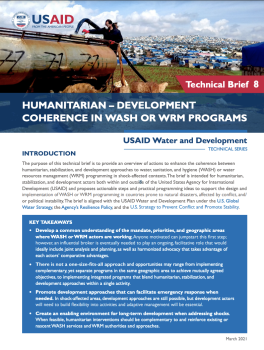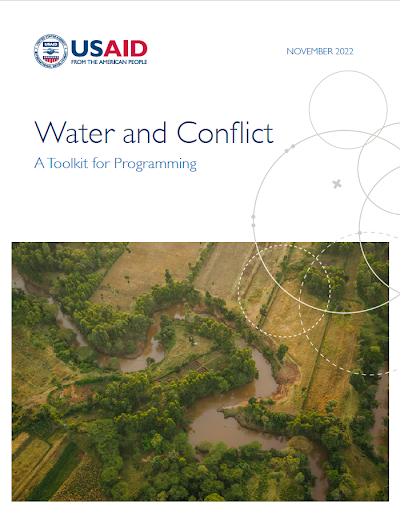ANTICIPATE AND REDUCE CONFLICT AND FRAGILITY RELATED TO WATER
Key Resources
Context
Over half of Water for the World High Priority Countries are in fragile settings. Conflict and fragility have a profound impact on water insecurity. In turn, water insecurity can create or exacerbate tensions that generate fragility within communities and countries and across borders.
For example:
- People in fragile settings are eight times more likely to lack access to safe water.
- Children under five living in conflict zones are up to 20 times more likely to die from diseases linked to unsafe water and sanitation than from direct violence.
- Women and girls are more likely than men to die in times of natural disasters, including droughts and floods.
USAID’s Approach
As the world faces more frequent and intense conflicts, extreme weather events, and climate-related migration, USAID works in fragile contexts through a multifaceted approach that focuses on systems preparedness, emergency response when needed, conflict mitigation, and coherence across approaches. Given that conflict and disasters often reveal and reinforce systemic inequalities, USAID maintains a “do no harm” posture and focuses on those marginalized populations that are at greatest risk.
USAID’s approach to anticipate and reduce conflict and fragility in the water sector focuses on four areas:
- Strengthen capacity to predict, prepare for, and adapt to shocks impacting water and sanitation systems in fragile settings
- Address humanitarian water, sanitation, and hygiene needs
- Strengthen cooperation and reduce conflict over water
- Strengthen coherence across humanitarian, development, and peacebuilding approaches to water and sanitation programming
Read more under “Strategic Objective 4” in the U.S. Global Water Strategy.
USAID WASH Lead, Amanda Robertson discusses SO4 in the Kenyan context
Related Stories
- Going Beyond Taps and Toilets in the Sahel
- Strengthening Drought Monitoring Across the Middle East and North Africa
- Water Brings Communities Together in Post-Earthquake Nepal
- Averting a Cholera Epidemic in the Wake of Dual Natural Disasters
- Supporting Safe Sanitation and Preventing Gender-Based Violence in South Sudan
Related Activities
Afia WASH
South Sudan
2021 -2026
PRO-WASH
Global
2018 – 2023
Household WASH
West Bank Gaza
2021-2024
Water and Sanitation Project (WATSAN)
Haiti
2017 – 2022
Sustainable Water and Sanitation Systems
Democratic Republic of Congo
2020 – 2025
Lowlands WASH
Ethiopia
2016 – 2020
Anka Jiko
Mali
2020 – 2027
FEWS NET
Global
Since 1985
TerresEauVie
Sahel
2019 – 2024
Related Resources
- Technical Brief: Humanitarian-Development Coherence in WASH or WRM Programs
- Water and Conflict Toolkit
- ResilienceLinks


